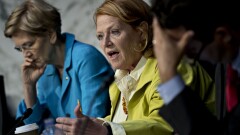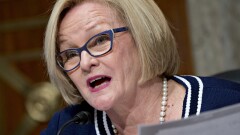WASHINGTON — While bankers typically donate more to the political re-election campaigns of
Yet that may have less to do with which party financial institutions and their employees prefer, and more to do with this fall's electoral map. Bankers typically
Overall, banks have given significantly more to the Republican Party than to the Democratic Party, including donations for House candidates and to the parties' congressional campaign committees.
But in terms of individual Senate incumbents, four of the top five recipients of commercial bank donations highlighted below are Democrats, all vying for re-election in states President Trump won in 2016. And all five of the Senate incumbents who have received the largest contributions from the industry supported the recent regulatory relief bill signed by Trump in May.
Individual Democrats in the Senate have received on average $43,910 versus $31,468 for Republicans (including lawmakers not running for re-election). This data is from donations given to all sitting senators from individuals working at commercial banks (who gave $200 or more) and from the banks' political action committees.
The data is from the Center for Responsive Politics as of July 23.










